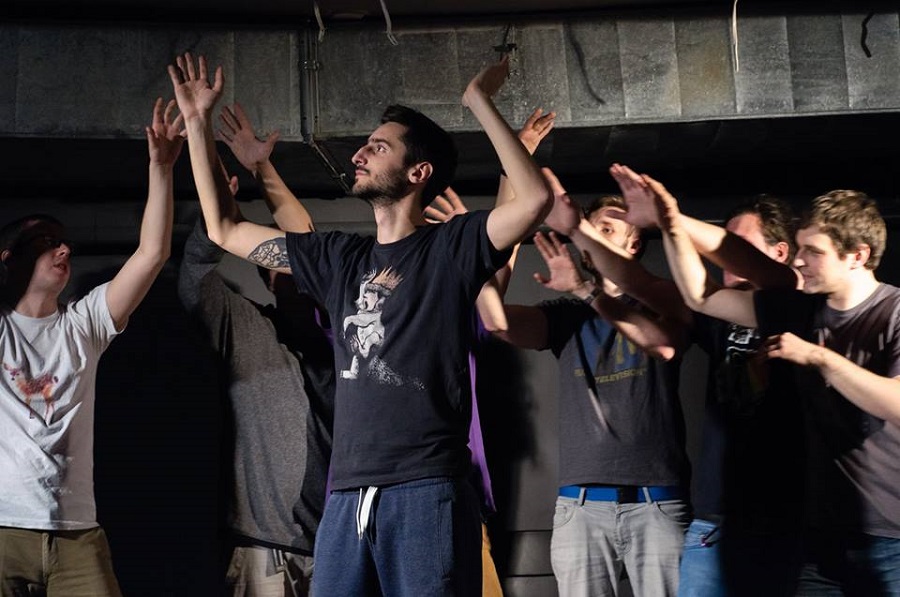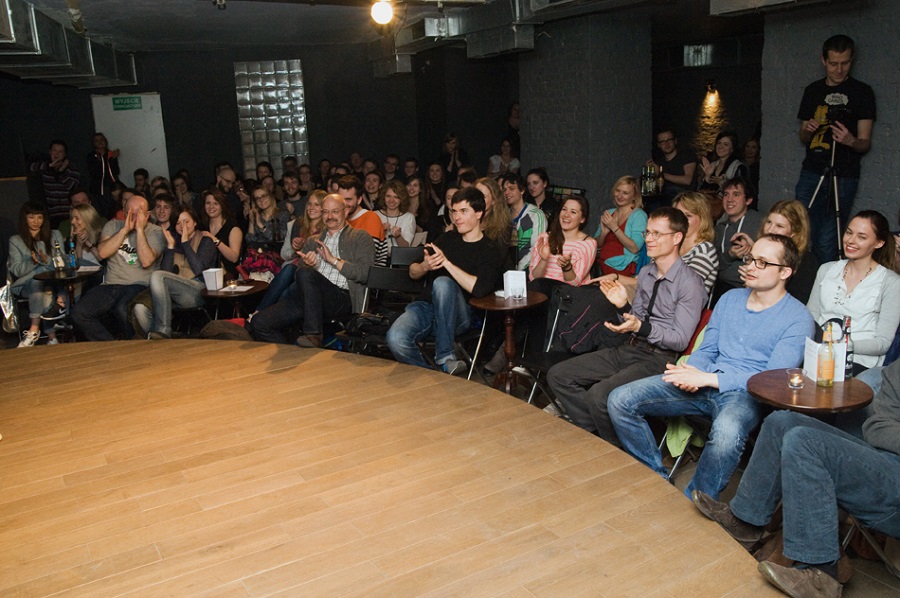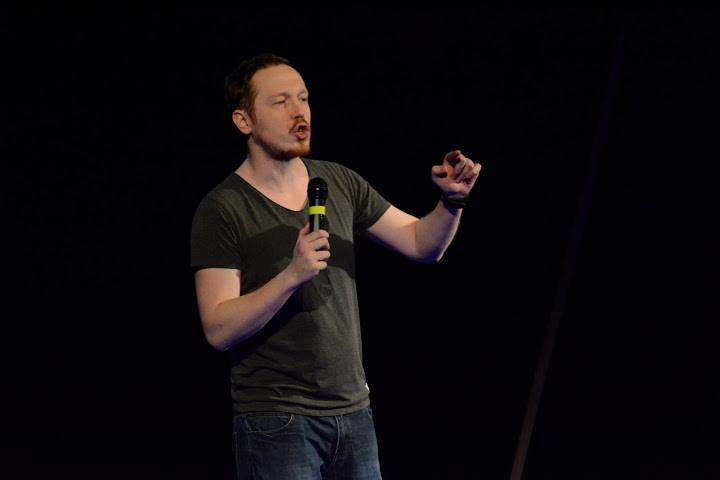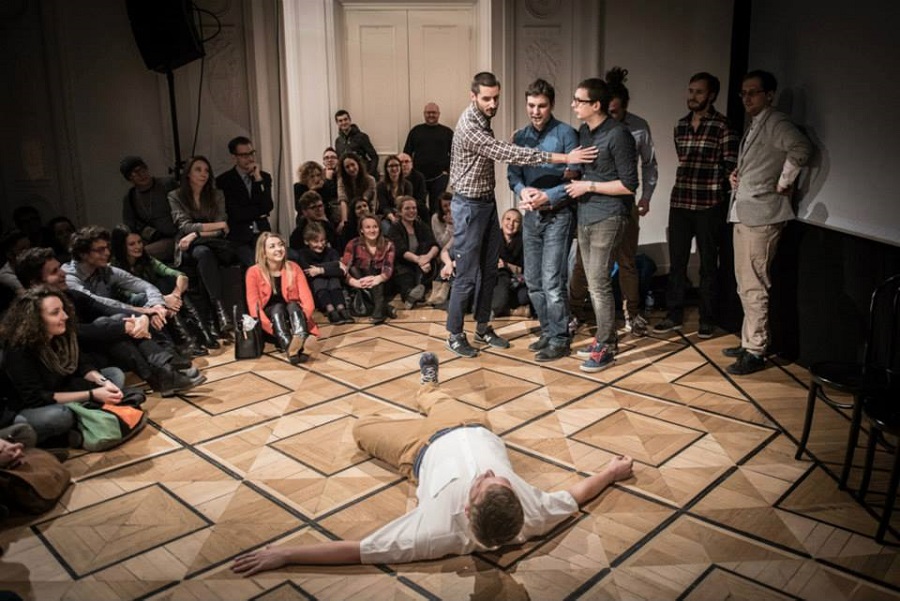While some consider Chicago the No. 1 place to perform and see improvisational theatre and the U.S. has long been familiar with the art form, European countries like Poland are now catching up. A short time ago improv was virtually unknown in Warsaw, with the first shows starting only in 2008. Eight years later, the Polish capital has become one of the Continent’s new hotspots for improv comedy. Today there are at least 20 groups performing in Warsaw, and that number, as well as the volume of people attending their shows, is still growing.
Poles have a longstanding love of theatre and contemporary theatre in particular—after all, this is the homeland of Tadeusz Kantor and Jerzy Grotowski. But Poland’s current government is quite conservative and nationalist, and theatre is now coming under greater scrutiny than it did a few years ago. As a result, the freedom of playwrights, directors, and performers is sometimes compromised: In November 2015, the Polish ministry of culture and vice premier Piotr Gliński attempted ban a play by Nobel Prize-winning Austrian author Elfriede Jelinek on the grounds that its opening scene was “pornographic.”
But Polish improvisational theatre is immune to such oversight—since improv shows don’t have a script, after all, they’re hard to censor. And improv appeals to young Poles for many reasons: It’s creative, it defies civil and religious authorities by poking fun at them, and establishes an interaction between actors and their audience. And with tickets for improv shows costing between 10 and 20 zloty (2.65-5.30 USD), it’s affordable for everyone.
Joanna Pawluśkiewicz and the Birth of Klub Komediowy
The core of the burgeoning Warsaw improv scene is Klub Komediowy (“Comedy Club”), a venue located on the hip Plac Zbawiciela (Savior Square). Joanna Pawluśkiewicz, one of the club’s cofounders, is an improviser with several groups, including her own, Hurt Luster. “In early 2013 I lived in Krakow, working as a screenwriter for HBO Polska,” she recalls. “I wanted to write comedy, but I didn’t know how to do it. At that time I watched a lot of American [TV] shows, and it turned out that all the people making them had an improv background.”
As there was no place to study improv in Krakow, Pawluśkiewicz decided to fly to the States. She enrolled in a course at the Second City, one of the oldest improv schools in Chicago and, as she puts it, “discovered a lot of amazing things that improvisers do onstage and that I thought I never would have been able to do…my job as a screenwriter is mostly sitting by myself writing stuff.”
Back in Poland, Pawluśkiewicz wanted to apply what she learned in the U.S., but soon realized that she didn’t know any local improvisers. “Then a friend of mine, Paula Bialski from the band Paula & Karol, told me about this group called Klancyk who did improv in Warsaw,” she says. Pawluśkiewicz moved to Warsaw, met with Michał Sufin from Klancyk, and in June 2013 they decided to set up their own place for performing improv in the city.
At first they couldn’t find a location that met their needs, but then Sufin saw an advertisement for the club on Plac Zbawiciela. It was one of several spaces devoted to culture that was available on a competitive basis and rented at a cheaper price. “When we saw this place, it was love at first sight as its layout reminded us of iO in Chicago,” recalls Pawluśkiewicz, referring to the venue whose alumni include Amy Poehler, Tim Meadows, and Chris Farley. Pawluśkiewicz and Sufin secured the space and, as they didn’t have enough funds to renovate it, launched a crowdfunding campaign. That effort was successful, but they still needed to invest their own money—so much, in fact, that Pawluśkiewicz was forced to sell her flat in Krakow to cover expenses.
The sacrifice wasn’t in vain: With the help of improvisers, friends, and volunteers, and following months of renovations, Klub Komediowy opened its doors on Feb. 20, 2014. The venue quickly began attracting improv groups and standup comedians, and today there are about 40 artists associated with the club.
“Now we are finally free and can perform the stuff we want to do,” says Pawluśkiewicz. This means that at Klub Komediowy you can watch musical improv and improv for kids, improv in English once a month, plus standup comedy shows. Pawluśkiewicz stresses that “the most important thing for us is to involve emotions and direct participation from our audience. We like when people laugh with us and not about us.”
Whereas Polish cabaret doesn’t appeal to the Klub Komediowy crew, hosting more English performances and offering improv workshops in English is definitely on their agenda. “A further big step would be having a closer collaboration with American improv schools,” adds Pawluśkiewicz. “We hope to host American improvisers in Warsaw at least three or four times a year.”
Another, perhaps less obvious aspect of improvisational theatre is its value as a social work technique, as Pawluśkiewicz and Klancyk discovered firsthand. “Many of the games and the techniques we perform were created by Viola Spolin in the 1940s to help the integration of immigrants in the U.S.,” she points out. “We drove around Poland for two years having workshops with kids in small towns and villages where we used Spolin’s theatre games for fighting against hate speech, which is widespread here. And it worked!”
Standups and Improvisers Join Forces
“We used to have shows all around Warsaw, but when this place opened we kind of moved here, as I cannot imagine a better venue to do improv in town,” explains Agnieszka Matan, founder of Hulaj, a group of four improvisers that performs at Klub Komediowy, in an interview in the club’s lobby. “Eight years ago, when I was still studying, only Klancyk was doing improv in town. They were very popular among university students and I went to see them,” Matan recalls. A few years later, she attended Szkoła Impro and Matan, who works part-time as a clerk at Warsaw’s Town Hall, soon realized that improv was much more than a hobby for her.
“We started performing in Polish and at first we didn’t plan to perform in English,” she says. “But if you want to learn about improv, you have to go to Chicago. And that’s what we did.” Together with the guys from Klancyk, Matan and her group went to the Windy City where they learned to improvise in English. Rather than detracting from their work, the forced shift to English was ultimately beneficial. “Using fewer words than we do when performing in Polish makes us more aware of what we’re doing onstage,” observes Matan, “and it adds to our performance.”
Antoni Syrek-Dąbrowski is a standup comedian as well as an improviser with the group Hofesinka. “I started doing improvisational theatre in 2011 and discovered it by chance,” he told me shortly before stepping onto Klub Komediowy’s stage with Everyman, his standup comedy show. “When I started performing standup comedy, I felt I needed more skills to interact with my audience,” he says. “That’s why I tried improv, and it turned out to be a wonderful way of performing, even though it’s completely different from standup.”
Today Syrek-Dąbrowski does standup and improv for a living, touring all over Poland with his shows. “I studied psychology and used to be an English teacher,” he says. “However, after a year of doing standup I realized that being onstage was the only thing that gave me joy. So I gave it a shot and pursued my passion. I never expected to become a standupper full time, but I’m making it and that’s pretty cool,” he says with a smile.
Syrek-Dąbrowski’s story proves how improv and standup in Poland work hand in hand: In Warsaw there are many performers who dabble in both forms. “I love doing standup and I love doing improv. The latter gives you the opportunity to be more attentive and empathetic. All that helps me a lot when I do standup and I’m the captain of my own ship,” Syrek-Dąbrowski says. “When I was a kid I remember asking my mother, ‘Who do you love the most, me or my brother?’ That’s what happens to me now: It’s like having two kids—standup and improv—and I love them both.”
Klancyk, the Pioneers of Polish Improv
Klancyk is the group that brought improvisational theatre to Poland in 2008, paving the way for a Warsaw improv scene. Initially, the troupe was just an academic experiment by students of the National Academy of Dramatic Art in Warsaw whose theatre backgrounds were limited to theory. Now they perform every Friday night at Klub Komediowy, where their shows are always sold out.
“We’re not trained actors and are mostly self-taught in improv basics,” they explain, admitting that being self-taught means “you’re bound to hit the wall sooner or later. Once we did, we flew to where all improvisers go. We spent two summers taking courses in Chicago at the iO’s training center and at the Annoyance Theatre. There we took inspiration from improv veterans, which opened our eyes to new ways of improvising, crushing our paradigms and exchanging ideas with people from all over the world.”
Since then the group has been spreading these ideas at home in Poland via Szkoła Impro, their improv school in Warsaw.
“The great thing about improv is that it’s so inclusive and democratic,” they explain, stressing that “we teach men and women, students and lawyers, baristas and drivers, executives and corporate employees.” In addition to classes, the school organizes biweekly improv jams where its students can test their skills in front of an audience, an experience that leads some participants to join improv groups or to create their own.
“It’s a good time to be an improviser here,” the group utters in unison. Klancyk continues to be the leading name in Warsaw improv, as you can always distinguish their shows from the rest. The troupe has its own distinctive sense of humor, radiating an energy and a camaraderie that are palpable to audiences. Klancyk mostly performs in Polish, but they’ve also done shows in English at improv festivals abroad. Initially dealing with the language barrier was stressful, they note, “but once we stopped worrying about our vocabulary and our Eastern European ‘movie villain’ accents, it turned out it was actually not that different from performing in our mother tongue.”
Improvising in English
Improv.pl is a group that performs only in English and is run by Marcin Kraszewski, a Warsaw-born American, and Ravi Kumar, who hails from India. They both moved to the Polish capital a few years ago for their studies. “I took my first theatre class in ’93 when I was 12 at the Todd Wehr Theater, Marcus Center for the Performing Arts in Milwaukee,” Kraszewski recounts. “For the following three years I took part in other productions in Milwaukee. While in high school, a team from ComedySportz visited us and taught us the basics of improvisation in a workshop.”
Kraszewski performed a few times in the U.S. with some friends, but his comedy career started in earnest when he moved to Warsaw in 2009. “Improv.pl began after my standup comedy project Laugh.pl folded,” he explains. Kraszewski came up with the idea of offering free improv workshops in English, which attracted about 10 people. Five meetings later, he cofounded Improv.pl. In April 2013, Kumar came onto the scene, reaching out to Kraszewski to ask if he was interested in improv sessions. When the pair met, Kumar recalls, they decided to start a regular show where they’d invite the audience to play short-form improv games with them, like a musical jam. Thus Warsaw’s biweekly Improv Sundays were born.
“We have an open-door policy on recruitment,” Kraszewski emphasizes. “Our Improv Sundays always include a few games that anyone can play. This allows us to meet talented people who have never even considered doing improv. Our entire team was recruited in this fashion.” Kumar insisted on the importance of making the Polish audience more familiar with improvisation onstage, since, he says, “here improv still feels like an underground art form, not a mainstream one.”
Having an improv festival in Warsaw would certainly help in making improvisational theatre more popular. There already are plenty of improv festivals around Poland; the most prominent ones are Improfest in Krakow and Podaj wiosło (“Give Me a Paddle”) in Gdansk. And yet, the Polish capital is still waiting for an improv festival of its own. As the Klancyk guys stressed: “It’s high time it gets one!”
Lorenzo Berardi is a Warsaw-based freelance journalist who hails from Italy. The author would like to thank Elizabeth Peck for her assistance with this article.





